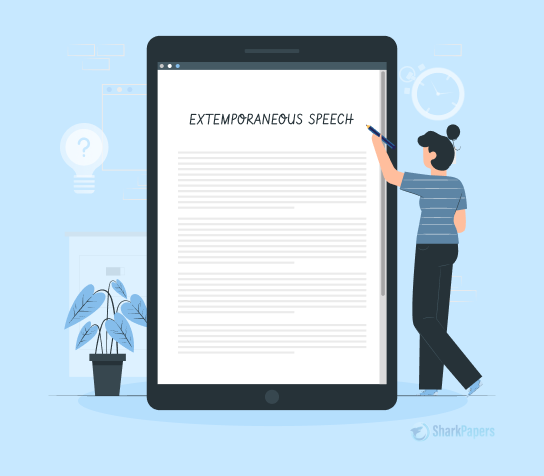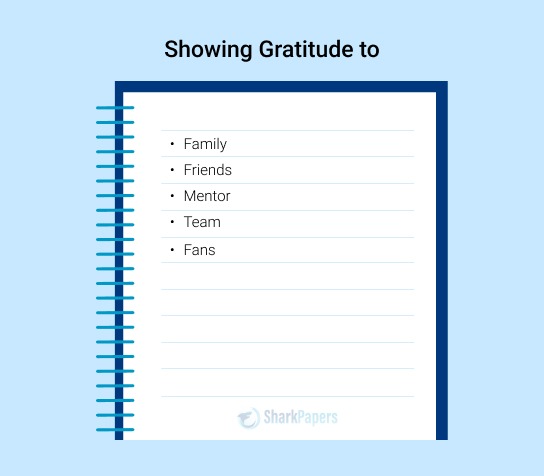Extemporaneous Speech Definition
Extemporaneous speeches are planned, but they are also very spontaneous. This means that you get a topic assigned to you right before delivering the speech. You have to speak in a clear way and share factual data. Even though it is spontaneous, it should be well-structured and based on research.
This speech is not read or memorized, so the speaker usually keeps short notes with them or on PowerPoint to help them deliver the speech. The spontaneous nature of this speech is what makes it a preferred way of delivering a speech.
In order to give a captivating speech, you should dress well, speak in a loud and clear voice, and be engaged with the audience. It is also important to deliver information to the audience in an interesting way.
When to Use Extemporaneous Speech?
You can give an extemporaneous speech at any time, but it's important to have some background information before you start. You might deliver it during an office meeting, inside a classroom, or at a speech contest.
You will have time to prepare and practice the speech, but you won't be able to read it from a paper or memorize it. You need to speak in a conversational style and do proper research.
How to Write a Extemporaneous Speech?
When you have to give an extemporaneous speech, you don't have a lot of time to prepare. But there are a few steps that you can take to make sure your speech is great.
1. Select a Topic
Usually, the topic is assigned by the committee members or your teacher. In case you have the choice to choose it yourself, choose a topic that you are familiar with. This will help you think of ideas and plan your speech more easily. Take a few minutes to brainstorm all the information you know about the topic.
2. Create an Outline
Draft a quick outline for your speech. Introduce the topic. Share an anecdote or statistic that the audience can relate to. Pose a question that will get the audience thinking about your topic.
A pdf has been attached here to get a better understanding of its outline.
3. Begin with the Body Paragraphs
Now that you have your outline, start working on your body paragraphs. Remember that you don't have a lot of time to write and practice your speech, so the body paragraph should only have a few key points.
4. Give Examples to Support Your Stance
Provide some examples of how you can continue with your main points by giving more detail or by providing specific examples. This will help the audience understand your topic better and also make them curious, which might result in some questions at the end.
5. Draft a Brief Conclusion
After giving a perfect speech it is necessary to conclude your speech on good notes. You must conclude with some quotation or a question that stays in the mind of the audience. Moreover, your conclusion must be short but thought-provoking.
If you prepare your speech before delivery on any given topic, our guide on speech writing is exactly what you need!
Extemporaneous Speech Delivery
“How to deliver an extemporaneous speech?”
This type of speech means you are prepared, but you don't have notes. An extemporaneous speech is different from an impromptu speech because, with an extemporaneous speech, you have more time to prepare.
“What is the difference between extemporaneous and impromptu speech?”
There is no time for a rehearsal in an impromptu speech. But in an extemporaneous speech, the speaker does have some time to get prepared. The speech is delivered from these notes, but you cannot read them directly.
You should use your time wisely when giving a speech. Pay attention to how you deliver your speech, including the way you speak and the rhythm of your words.
Extemporaneous Speech Advantages and Disadvantages
There are some pros and cons to giving a speech this way. Read these to understand the concept of extemporaneous speech.
Pros:
- Extemp speeches are better than other speeches because they sound more natural and spontaneous. They are also delivered in a conversational style.
- People are more likely to trust someone who is well-read on a topic and is not reading from a page when they speak.
- An extemporaneous speech gives you more chances to interact with your audience.
- The speaker can ask a question in the middle of a speech to ensure that everyone is paying attention.
- You can add stories and examples that are relevant to your topic in an extemporaneous speech. Additionally, you can quote other speakers in your speech.
Cons:
- If you are scared of public speaking, then extemporaneous speech will be very fierce for you.
- If the speaker gets nervous or stutters in between, it will look like they didn't prepare well.
- If you don't plan your speech well, it can be too short or too long.
- The speaker may be unfamiliar with some of the vocabulary words in the topic.
Extemporaneous Speech Examples
If you are still having trouble understanding how to give a speech without preparation or how to write one quickly, check out the examples mentioned below:
Extemporaneous Speech Topics
Some extemporaneous speech topics are given below:
- For what reason do I cherish playing volleyball?
- When will I become a tycoon?
- For what reason is Playstation better than Xbox?
- The best musician is - fill a name-
- Gays don't have equivalent freedoms, is it valid?
- Political unsteadiness in my nation is expected to?
- For what reason is facebook's ubiquity tumbling down so rapidly?
- For what reason are unlawful workers not given privileges?
- Are web wrongdoing and theft punished?
- It is vital to Stop the conflict in Afghanistan
There are many different types of extemp speech topics. You can choose one that you are knowledgeable about or one that you can mold to fit your own knowledge.
Extemporaneous Speech Tips
If you want to give a speech without preparation, these tips will help you.
- The speech outline should be easy to understand, so keep it simple.
- Keep index cards with you as cues. This will help you avoid writing on full paper.
- If you are using technology, such as PowerPoint, practice with it before giving your speech.
- You should speak to people in a way that sounds extemporaneous speaking naturally and not like you're reading from a script.
- If you have enough time, record your speech and then listen to it yourself.
- It is a good idea to rehearse your speech in front of an audience so you can get feedback on what works and what needs improvement.
This was all for extemporaneous speech. If you still feel you won't be able to grasp the idea of extemporaneous speech, we can help.
If you need to write a speech quickly, get in touch with the speech writing service from SharkPapers.com.
We aim to provide the best services to students. We have a professional team of writers who can help you deliver a quality speech at a reasonable price.
Just say, 'write my paper' and we'll get started!













 Not seeing it? Check Promotions or Spam — inboxes get protective.
Not seeing it? Check Promotions or Spam — inboxes get protective.